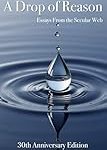Tune in to Freethinker Podcast as host Edouard Tahmizian is joined by Internet Infidels President John MacDonald in this 45-minute interview with historian and freethinker Richard C. Carrier. Carrier fields several questions from his interlocutors concerning how he harmonizes certain New Testament passages with his Christ myth theory, whether there's textual evidence that the Book of Mark predates that of Matthew (and, if so, how that sits with the resurrection appearance accounts), whether the Q source existed (and if so, whether Mark used it), whether seemingly anti-Jewish interpolations might really be references to another instance where God's chosen people fail to meet God's expectations, whether there was a grave site 'disappearing bodies' problem spurring the Nazareth inscription, and much more! Check out this gripping interview with our returning historian on facts that some suggest don't sit well with the nonexistence of a historical Jesus.
Join host Edouard Tahmizian in this half-hour follow-up interview with Internet Infidels President John MacDonald about why he thinks that the canonical Gospels do not support the idea that Jesus died as a kind of stand-in for us sinners (most clearly evidenced in the Gospel of Luke), what the historical Jesus would've thought about removing circumcision as a requirement for becoming a Christian, the alternative Gnostic understanding of salvation, how the gospel of Mark suggests that the historical Jesus would've had no inkling of the concept that his eventual death might serve as a substitute punishment for the sins of all humankind, and how the historical Jesus' understanding of love differed from the ancient Greek concept of it. MacDonald also compares the societal fall-out following Socrates' execution in Plato's dialogues to that anticipated by the historical Jesus, explains how the idea that Jesus died for our sins makes little sense not only because substituting one person for another's crimes is morally absurd, but because most of us haven't committed any sins that warrant capital punishment, and offers his take on Richard Carrier's defense of Jesus mythicism. Check out this historical and philosophical exploration of one of the core claims of modern Christianity (and the
partial transcript of it on the Secular Frontier).
Tune in to host Edouard Tahmizian's nearly hour-long interview with Jonathan M. S. Pearce, a founding member of the Tippling Philosophers, a friendly group of believers and nonbelievers who regularly meet over a pint of ale to discuss life's big questions. Pearce is the author of several books and a speaker on philosophy, religion, and skepticism best known for his old popular blog A Tippling Philosopher. In this interview, Pearce outlines how William Lane Craig's rendition of the kalam cosmological argument presupposes an implausible Platonism about abstract objects and a particular notion of causation that, if rejected, deflates the force of the argument. The interlocuters also canvass how the only remaining phenomena challenging naturalism are the beginning of the universe and consciousness, whether Jesus would have ever been buried in a tomb at all, why there are contradictions between the Gospels on basic details about the empty tomb story, the flaws in Mike Licona's argument that Paul wouldn't have hallucinated a risen Jesus if he had then seen Jesus as an enemy, the rationality of belief in miracles, the role of motivated reasoning in apologetic arguments, much more! Check out this fascinating interview with a prolific author on the Gospels as more propaganda than history.
Join Internet Infidels social media manager Edouard Tahmizian and Vice President of Internet Infidels John MacDonald for an interesting talk about how little biblical scholars claim to know about Jesus (namely, that he was baptized by John the Baptist and crucified), about whether Jesus even knew John the Baptist, and about the relationship between Jesus and Moses in the Gospel of Matthew as an illustration of how Gospel authors retooled Old Testament stories for new theological purposes in the New Testament. Check out this interview for a quick overview of an important aspect of early Christian history and an update on Secular Web Kids.
Join host Edouard Tahmizian in this 5-minute interview with a mystery guest about the meaning of the word "secular," about why he is not a Christian and doesn't buy the empty tomb narratives as evidence for Jesus' resurrection, about what human and animal suffering can tell us about the existence or nonexistence of God, about whether beauty in the world points to the existence of God, and more! Check out the mystery guest's answers to these deep questions put in words that everyone can understand.
In this nearly hour-long interview with the prominent historian and freethinker Richard C. Carrier, Freethinker Podcast host Edouard Tahmizian and fellow Internet Infidels board member John MacDonald talk with Carrier about his conversion from Christianity to Taoism before he adopted metaphysical naturalism, his mystical experiences, the literature on the historicity of Jesus and Jesus mythicism, the original intent of the authors of the canonical Gospels, and much more! Tune in for this fascinating discussion with a long-running scholar and freethought activist.



